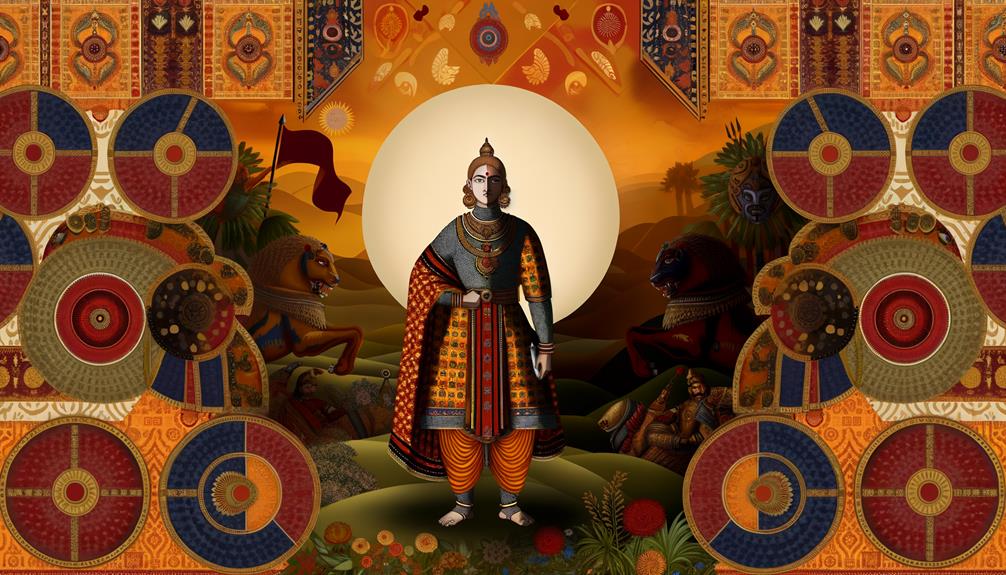Veer Name Meaning in Hindi
The name 'Veer' in Hindi means 'brave' or 'heroic.' It's deeply rooted in ancient Indian culture and Sanskrit, highlighting courage and strength. Historically, the name appears in epic texts like the Mahabharata and Ramayana, symbolizing valor and ethical fortitude.
'Veer' also combines with words like 'Vīratā' to mean bravery. This name reflects cultural significance and heroism, often chosen by parents to inspire resilience.
Historical figures like Veer Savarkar and Veer Abdul Hamid exemplify this valor. If you're curious about Veer's impact in literature, modern media, and the arts, there's more fascinating information ahead.

Key Takeaways
- 'Veer' in Hindi translates to 'brave' or 'heroic'.
- The name 'Veer' is derived from Sanskrit, emphasizing strength and bravery.
- 'Veer' has historical significance in Indian epics like the Mahabharata and Ramayana.
- The name symbolizes valor, courage, and divine strength in Indian culture.
- 'Veer' is used in compound words like 'Vīratā', meaning bravery.
Historical Origins of Veer
Although the name 'Veer' is widely recognized today, its historical origins are deeply rooted in ancient Indian culture and literature.
You might find it interesting that 'Veer' translates to 'brave' or 'heroic' in Hindi. This name is frequently found in ancient texts like the Mahabharata and Ramayana, where it's associated with valor and honor.
In Vedic literature, 'Veer' epitomizes courage and strength, reflecting the virtues celebrated in warriors and kings. This term has transcended centuries, maintaining its significance in modern Indian society.
When you hear the name 'Veer', you're tapping into a rich cultural heritage that venerates bravery and noble deeds. Understanding this context gives you a deeper appreciation for the timeless qualities embodied in the name.
Linguistic Analysis
Delving into the linguistic roots of 'Veer', you'll find that its etymology is steeped in Sanskrit, where the word 'वीर' (Vīra) directly translates to 'hero' or 'warrior'.
This term is derived from the Proto-Indo-European root *wī-ro-, indicating strength and bravery. In Hindi, 'Veer' retains this meaning, emphasizing valor and courage.
The phonetic structure of 'वीर' is quite straightforward, with the elongated 'ee' sound stressing its importance. Additionally, 'Veer' is a common element in compound words within Hindi, such as 'वीरता' (Vīratā), meaning bravery.
This linguistic analysis underscores the word's significance in conveying esteemed qualities and its seamless integration into the Hindi lexicon.
Cultural Significance
You can't ignore the historical roots of the name Veer, often associated with valor and heroism in ancient Indian texts. Literary references in epics like the Mahabharata and Ramayana further solidify its significance.
Additionally, the name holds strong connections to religious contexts, symbolizing divine strength and righteousness.
Historical Roots
Rooted in the rich tapestry of Indian history, the name 'Veer' embodies cultural significance as it translates to 'brave' or 'warrior' in Hindi, reflecting a legacy of valor and heroism.
You'll find that 'Veer' has historical roots deeply intertwined with India's ancient epics and martial traditions. Warriors revered for their courage often bore this name, symbolizing their pivotal role in defense and conquest.
The term 'Kshatriya', denoting the warrior class in the Varna system, frequently associated with names like 'Veer', highlights the importance of bravery in societal hierarchy.
Understanding this, you can appreciate how 'Veer' encapsulates not just a name but a profound historical and cultural narrative of bravery, loyalty, and martial prowess.
Literary References
In the domain of literature, 'Veer' continues to resonate, embodying the archetype of the valiant hero in countless Indian epics, folktales, and modern narratives. You'll find this name exemplifies bravery, honor, and duty, often represented through iconic characters.
Consider the following examples:
- Mahabharata: Arjuna, a central hero, exemplifies the 'Veer' spirit through his unmatched archery skills and unwavering righteousness.
- Ramayana: Lord Rama, the epitome of virtue and bravery, serves as a quintessential 'Veer'.
- Folktales: Stories of Rajput warriors often highlight their valor and steadfastness.
- Modern Literature: Contemporary novels and films frequently portray protagonists named 'Veer' to symbolize courage and heroism.
Religious Contexts
Although the name 'Veer' carries immense significance in religious contexts, it mainly symbolizes divine courage and unwavering righteousness across various cultural traditions.
In Hinduism, 'Veer' often honors divine warriors like Arjuna and Hanuman, embodying valor and moral integrity.
Sikhism reveres the term, as it reflects the valorous spirit of the Khalsa, emphasizing selfless service and martial prowess.
Jainism also uses 'Veer' to describe Tirthankaras, who display extraordinary fortitude and spiritual discipline.
Veer in Literature
You'll find that 'Veer' embodies heroism in classic texts, often symbolizing bravery and valor.
In modern literature, it carries a nuanced symbolism that reflects contemporary cultural significance.
Stories frequently use 'Veer' to highlight themes of courage and moral fortitude, resonating deeply within the cultural narrative.
Heroism in Classic Texts
When you explore classic texts, you'll find that the word 'Veer' embodies not just bravery but a complex tapestry of virtues celebrated in Hindi literature.
This term transcends mere physical courage, encompassing a multi-faceted heroism. In epics like the Mahabharata and Ramayana, 'Veer' heroes exhibit:
- Dharma: Adherence to righteous duty.
- Tyaga: Sacrificial spirit for the greater good.
- Satya: Commitment to truth.
- Karuna: Compassion towards others.
These texts don't just highlight physical prowess; they explore the ethical and moral dimensions of heroism.
Symbolism in Modern Literature
Modern literature often employs 'Veer' as a powerful symbol, reflecting contemporary struggles and triumphs while maintaining its deep-rooted cultural and ethical connotations. You'll find 'Veer' representing courage against societal challenges, embodying resilience in adversity, and highlighting moral integrity in complex narratives. By doing so, authors connect modern readers with timeless values through a culturally significant archetype.
| Aspect | Modern Symbolism | Interpretation |
|---|---|---|
| Courage | Societal Challenges | Overcoming societal obstacles |
| Resilience | Adversity | Persisting through difficulties |
| Moral Integrity | Complex Narratives | Upholding ethical standards |
In modern texts, 'Veer' isn't just a character; it's an embodiment of ideals that resonate with readers, making stories both relatable and inspirational. This portrayal guarantees that the essence of 'Veer' remains relevant and impactful.
Cultural Significance in Stories
In literature, the character 'Veer' serves as a cultural touchstone, embodying the values of bravery, honor, and ethical fortitude within diverse narratives.
You'll find that Veer's presence in stories often highlights critical cultural themes such as:
- Heroism – Veer personifies the quintessential hero, taking on challenges that others shy away from.
- Moral Integrity – His actions are guided by a strong ethical compass, underscoring the importance of righteousness.
- Sacrifice – Veer frequently sacrifices personal gain for the greater good, illustrating selflessness.
- Cultural Identity – Veer's character often anchors stories in traditional values, reflecting societal ideals.
Popularity Trends
The name Veer has surged in popularity in recent years, reflecting a growing appreciation for its strong cultural significance and heroic connotations. You'll notice that more parents are choosing Veer for its robust and inspiring meaning, derived from the Hindi word for 'brave' or 'warrior.'
This trend aligns with an increasing desire to imbue children's names with valor and cultural heritage. In India, the name Veer resonates deeply, often associated with historical figures and epic tales extolling courage.
Additionally, the rise in its popularity is influenced by modern media, including films and literature, which celebrate characters named Veer. It's a name that stands out, embodying strength and cultural pride in an ever-evolving society.
Famous Personalities Named Veer
Among the notable individuals named Veer, Veer Savarkar stands out as a revolutionary freedom fighter and influential writer in India's struggle for independence. His contributions are pivotal in shaping modern Indian identity.
To understand the impact of personalities named Veer, consider the following:
- Veer Savarkar: A leader in the Indian independence movement, he authored works advocating for self-rule.
- Veer Abdul Hamid: A celebrated soldier who received the Param Vir Chakra posthumously for his valor in the 1965 Indo-Pak war.
- Veer Surendra Sai: A tribal leader who led a prolonged rebellion against British colonial rule in Odisha.
- Veer Narayan Singh: A freedom fighter known for his resistance against British exploitation in Chhattisgarh.
These individuals exemplify bravery and commitment to justice.
Veer in Modern Context
Today, the name Veer symbolizes courage and resilience, embodying qualities that inspire modern generations to face challenges head-on.
In contemporary India, naming a child Veer is a deliberate choice, reflecting aspirations for bravery and tenacity.
You'll find that Veer resonates across various sectors—be it in corporate leadership, sports, or the arts. This name's cultural significance is rooted in historical valor, yet it adapts seamlessly to today's dynamic landscape.
When you meet someone named Veer, you're likely encountering an individual whose identity is intertwined with fortitude and perseverance.
Embracing this name means perpetuating a legacy of strength, aligning personal identity with enduring virtues that transcend time.
Conclusion
In the grand tapestry of Indian culture, the name Veer weaves a narrative rich with valor and honor. Much like Arjuna in the Mahabharata, those named Veer carry the promise of bravery and strength.
Reflecting both historical depth and modern appeal, Veer remains a beacon of cultural pride. As you explore names, remember that choosing Veer isn't just about a name—it's about embracing a legacy that resonates through time.






